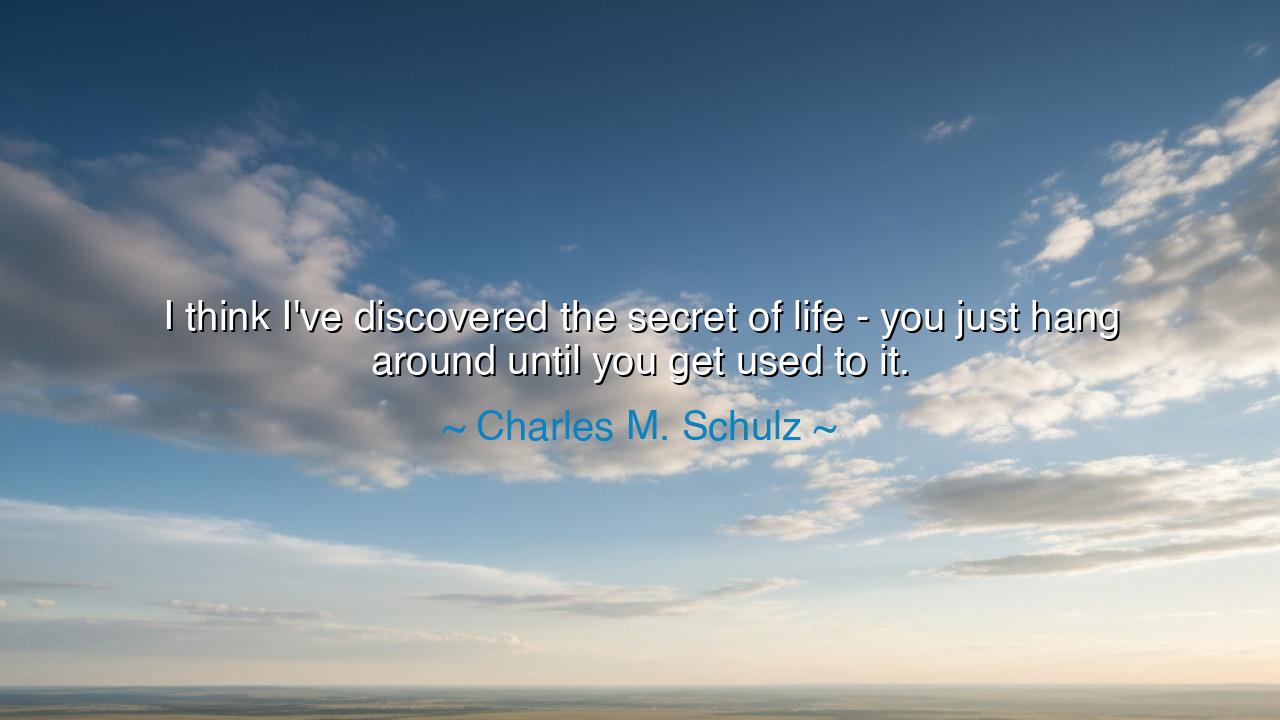
I think I've discovered the secret of life - you just hang around
I think I've discovered the secret of life - you just hang around until you get used to it.






In his gentle humor and quiet genius, Charles M. Schulz, the creator of Peanuts, once spoke a truth both humble and profound: “I think I've discovered the secret of life — you just hang around until you get used to it.” At first glance, his words may seem lighthearted, even casual, like the musings of his beloved character Charlie Brown. Yet beneath their simplicity lies a deep current of wisdom — the understanding that life is not conquered, but adapted to; not mastered, but endured with grace. Schulz, a man who often explored melancholy and hope through laughter, reminds us that the secret to living well is not found in control or certainty, but in patience and persistence.
Life, as Schulz knew, is rarely easy. It arrives without instruction and moves with mystery. One moment it lifts us with joy; the next, it tests us with sorrow. The human heart, fragile and stubborn, seeks meaning amid chaos. And so, the secret, he says, is simply to “hang around” — to stay, to endure, to let time soften the sharp edges of pain and unfamiliarity until life, with all its oddities, becomes something we can bear, and even cherish. What begins as bewilderment can, with enough time and courage, become acceptance — and acceptance, in its quiet strength, is a kind of peace.
There is a story from the life of Helen Keller, a woman born without sight or hearing, who lived her early years in isolation and rage. To such a soul, life must have seemed unbearable, a world of darkness and confusion. Yet she endured; she “hung around.” Through her teacher Anne Sullivan’s patience and her own fierce will, Keller learned to communicate, to learn, to dream. What once was alien and cruel became, in time, familiar and even beautiful. Through endurance, she found joy. Through persistence, she discovered purpose. Her story is the living proof of Schulz’s teaching: that when life feels too strange or painful to understand, we must simply keep going — and in time, we grow accustomed, not by resignation, but by awakening.
The ancients, too, spoke of this wisdom in other words. The Stoics taught that the first art of living is acceptance — to meet life as it comes, without bitterness, and to remain steadfast until the storm passes. Epictetus said, “We cannot choose our circumstances, but we can choose how we meet them.” And this, perhaps, is what Schulz means in his tender, humorous way. To “get used to life” is not to become numb, but to become wise — to stop fighting what cannot be changed and start finding meaning in the small, enduring things: a sunrise, a shared smile, a moment of rest.
Hanging around is not laziness; it is faith in motion. It is the trust that if we can just remain a little longer — through heartbreak, through loss, through the dullness of waiting — the pattern of things will reveal itself. Even sorrow, when lived through fully, becomes a teacher. Even confusion, when faced with patience, becomes clarity. The river does not demand to know its destination; it flows, and in flowing, it finds it. So too must we move with life, not against it, until we learn to breathe within its rhythm.
But how does one live this way? Begin, first, by not fleeing the uncomfortable. When life feels heavy or senseless, resist the urge to run or despair. Instead, stay — breathe, observe, endure. Let time work its ancient magic. Give yourself permission to not understand everything immediately. Let love, loss, and uncertainty sit beside you like old friends. In doing so, you will find that life’s mysteries soften, and what once felt unbearable becomes strangely precious.
And so, my children, take Schulz’s words not as irony, but as sacred truth. The secret of life is not found in brilliance or control, but in persistence — in showing up each day, again and again, until the unfamiliar becomes familiar, until pain turns to wisdom, and confusion gives birth to peace. The one who endures learns that life, for all its chaos and imperfection, is not meant to be solved but lived — and that, perhaps, is its quiet, beautiful secret.






AAdministratorAdministrator
Welcome, honored guests. Please leave a comment, we will respond soon